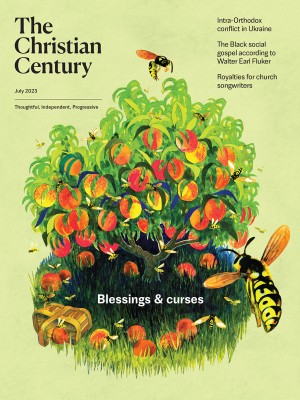American Protestantism and what it has done
David Hollinger explores how Protestantism has shaped—and warped—a nation’s intellectual life.
Does Christianity have a future in the United States? David Hollinger poses this question in his important new book. Few people are more qualified to answer it than Hollinger, who over the course of five decades has established himself as one of America’s foremost intellectual historians.
Hollinger has long been preoccupied with how changes in American society, especially growing ethnic and racial diversity, are reflected in American intellectual life. His first book, a biography of Morris Cohen, showed how the Jewish, Russian-born philosopher helped transform an academic discipline dominated by White Anglo-Saxon Protestants. Later books—and dozens of essays—cataloged, analyzed, and explained what might be called the de-provincialization of the American mind: the (very slowly) growing openness of American intellectuals to ideas and cultures from non-White and non-American communities.
Read our latest issue or browse back issues.
Why was American intellectual life so provincial in the first place? This question is Hollinger’s starting point in Christianity’s American Fate. His answer is simple: Protestantism. The United States may not have been founded as a Christian nation, but the dominance of Protestants in American society shaped (warped, Hollinger strongly implies) the country’s intellectual life for well over a century.
Unlike many European nations, the United States never developed a strong tradition of agnosticism or atheism. Elsewhere, universities played an important role in questioning received religion. In the United States, by contrast, universities often sheltered religion, or at least Protestantism, from critical examination. To illustrate this point, Hollinger notes that William James and Josiah Royce, two of the founders of American philosophy, placed religious claims beyond intellectual scrutiny. American Protestant ministers, fearing a backlash from their congregants, proved equally unwilling to consider what ideas like Darwinism or biblical criticism might mean for their faith.
The remainder of Christianity’s American Fate deals with the breakup of this Protestant dominance and the consequences of its collapse. Some of this material repeats what Hollinger has argued in previous books. After Cloven Tongues of Fire (2013) explored how intellectual challenges to American Protestant hegemony, especially those posed by Jewish thinkers, forced Protestants to rethink what it meant to be a Protestant, a Christian, and an American. Protestants Abroad (2017) explained the “missionary boomerang,” in which Protestant missionaries, changed by their encounter with non-American cultures, returned home and sought to impart a more expansive worldview to their fellow Protestants. Hollinger retells these stories in Christianity’s American Fate with admirable clarity and brevity.
More original is the discussion of the struggle between ecumenical and evangelical Protestants over the meaning of American Christianity. (Hollinger uses ecumenical to refer to what others would call liberal or mainline Protestants.) He insists that neither tradition can be understood without reference to the other. “Too often,” he writes, “evangelicalism’s rise to popularity and influence is narrated in relative isolation, not in its dialectical relationship with another Protestantism whose adherents had more respect for modern science and were more willing to accept ethnoracial diversity.”
In the decades after World War II, these two traditions chose different paths. Ecumenical Protestants, shaped by their encounters with diversity, proved (somewhat) willing to rethink their ideas about American greatness and Protestant supremacy. Evangelicals, by contrast, loudly reasserted those ideas, positioning themselves as the defenders of the Christian nation and the Christian family. The Protestant culture which had once dominated American intellectual life found a new home, albeit a more cramped one, within the evangelical community.
This account may sound unduly flattering to ecumenical Protestants—but Hollinger does not let them off the hook. He notes the overconfidence, even arrogance, with which ecumenical leaders confronted the post–World War II world. As one of Hollinger’s own students, Gene Zubovich, demonstrates in his superb 2022 book, Before the Religious Right: Liberal Protestants, Human Rights, and the Polarization of the United States, this overconfidence led ecumenical clergy to get far, far ahead of their laity on many political issues. Right-wing politicians, preachers, and activists rushed into this yawning gap, helping mobilize what would come to be called the Christian right.
Christianity’s American Fate is a scholarly book, but it has an unmistakable polemical edge, especially in its closing chapters. Hollinger speaks directly to ecumenical Protestants, calling on them to take back the “symbolic capital” they yielded so freely to evangelicals. In particular, he urges them to reclaim the discipline of biblical interpretation. He laments that yielding ground on this front “meant that ecumenical voices in the public arena were mostly silent about the one cluster of fundamental issues on which they might have spoken with unique authority and sophistication: what the Bible actually was, how it should be read, and how it could guide conduct in today’s society.” The role of publicly interpreting the Bible has thus fallen to preachers and politicians who confidently assert that “the Bible says” that God is a right-winger (a phenomenon analyzed—and condemned—by New Testament scholar Tony Keddie in Republican Jesus: How the Right Has Rewritten the Gospels, which Hollinger cites approvingly).
What, then, is left of Christianity in the United States? Hollinger suggests that people of a liberal persuasion should not worry about whether ecumenical Protestantism survives as a distinct tradition. Rather, our concern should be with how Christianity, especially its ecumenical variety, has helped birth a more expansive and universalistic set of values. Ecumenical Protestantism may have only been a way station on the journey toward a new ethic, one comfortable with diversity and open to the discoveries of modern science. Whether or not ecumenical Protestants agree with Hollinger’s conclusion, they would be well-advised to take his challenge seriously.






